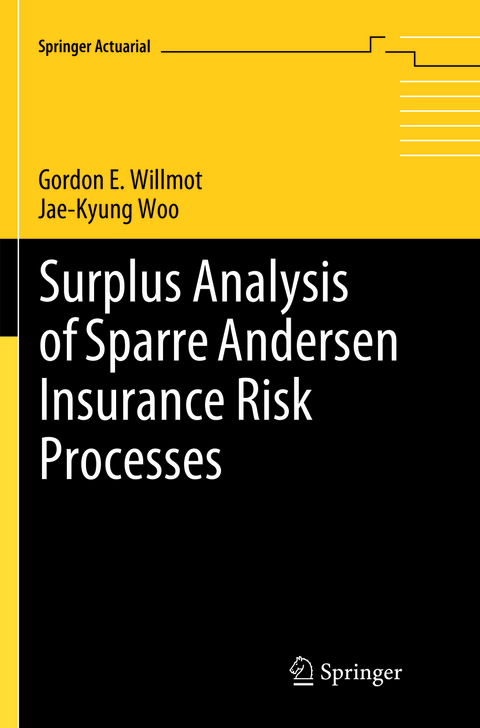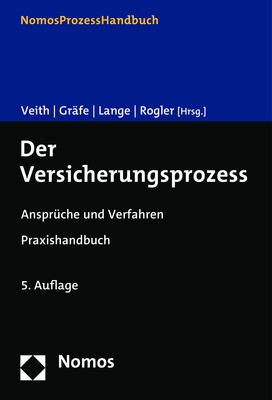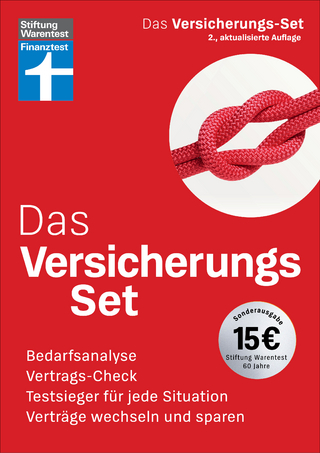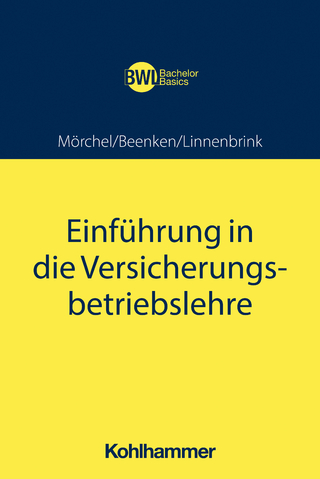
Surplus Analysis of Sparre Andersen Insurance Risk Processes
Springer International Publishing (Verlag)
978-3-319-89066-1 (ISBN)
This carefully written monograph covers the Sparre Andersen process in an actuarial context using the renewal process as the model for claim counts.
A unified reference on Sparre Andersen (renewal risk) processes is included, often missing from existing literature. The authors explore recent results and analyse various risk theoretic quantities associated with the event of ruin, including the time of ruin and the deficit of ruin. Particular attention is given to the explicit identification of defective renewal equation components, which are needed to analyse various risk theoretic quantities and are also relevant in other subject areas of applied probability such as dams and storage processes, as well as queuing theory.
Aimed at researchers interested in risk/ruin theory and related areas, this work will also appeal to graduate students in classical and modern risk theory and Gerber-Shiu analysis.
Gordon E. Willmot is Munich Re Chair in Insurance and professor in the Department of Statistics and Actuarial Science at the University of Waterloo, Canada. His research interests are in stochastic modelling in insurance. Willmot has (co-)authored over one hundred research papers in leading actuarial and statistical journals. He is also co-author of Lundberg Approximations for Compound Distributions with Insurance Applications (Springer), Loss Models - From Data to Decisions and Loss Models - Further Topics (Wiley), and Insurance Risk Models (Society of Actuaries). He is editor of Insurance: Mathematics and Economics. Jae-Kyung Woo is Associate Professor in the School of Risk and Actuarial Studies at the University of New South Wales, Sydney. She has worked at the University of Hong Kong and Columbia University prior to joining UNSW. Her research interests are focused on risk theory, reliability theory, aggregate claim analysis, and queueing theory. She has published about twenty papers dealing with the subject of the present monograph and related topics.
1 Introduction.- 2 Technical Preparation.- 3 Gerber-Shiu Analysis in the Classical Poisson Risk Model.- 4 Gerber-Shiu Analysis in the Dependent Sparre Andersen Model.- 5 Models Involving Erlang Components.- 6 The Time of Ruin in the Classical Poisson Risk Model.- 7 Related Risk Models.- 8 Other Topics.- References.- Index.
"The monograph is devoted to the surplus analysis of the Sparre-Andersen process using the renewal process as the model for claim counts. ... This book is intended for researchers interested in ruin/risk theory, and will also be useful for graduate students specialized in classical and modern risk theory." (Anatoliy Swishchuk, zbMATH 1391.91006, 2018)
“The monograph is devoted to the surplus analysis of the Sparre-Andersen process using the renewal process as the model for claim counts. … This book is intended for researchers interested in ruin/risk theory, and will also be useful for graduate students specialized in classical and modern risk theory.” (Anatoliy Swishchuk, zbMATH 1391.91006, 2018)
| Erscheinungsdatum | 22.01.2019 |
|---|---|
| Reihe/Serie | Springer Actuarial |
| Zusatzinfo | VIII, 225 p. 3 illus. |
| Verlagsort | Cham |
| Sprache | englisch |
| Maße | 155 x 235 mm |
| Gewicht | 406 g |
| Themenwelt | Mathematik / Informatik ► Mathematik |
| Betriebswirtschaft / Management ► Spezielle Betriebswirtschaftslehre ► Versicherungsbetriebslehre | |
| Schlagworte | classical compound poisson risk model • classical Poisson risk model analysis • classical Poisson risk model derivation • defective renewal equation • deficit at ruin • delayed renewal risk model • dependent Sparre Andersen risk model • Dickson Hipp operator • discrete renewal risk model • Gerber Shiu function • Laplace transform • mixed Erlang distribution • MSC (2010): 60-02, 60G50, 60K10, 62P05 • renewal risk process • Ruin Probability • time of ruin |
| ISBN-10 | 3-319-89066-2 / 3319890662 |
| ISBN-13 | 978-3-319-89066-1 / 9783319890661 |
| Zustand | Neuware |
| Haben Sie eine Frage zum Produkt? |
aus dem Bereich


